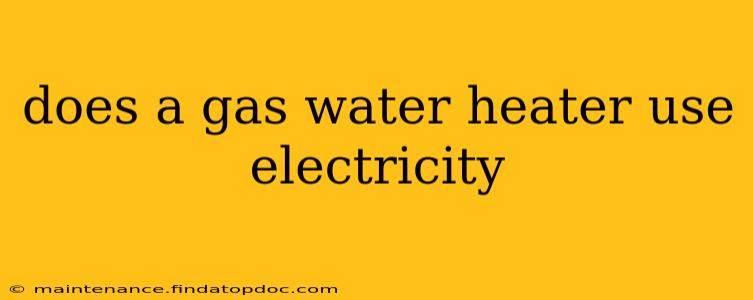While the primary function of a gas water heater is to heat water using natural gas or propane, it does indeed require some electricity. It's not a fully independent system; electricity plays a crucial role in its operation, albeit a smaller one compared to the gas. Let's break down exactly how and why.
What Does the Electricity Power in a Gas Water Heater?
The electricity in a gas water heater doesn't heat the water directly. Instead, it powers several key components:
-
The Ignition System: Most modern gas water heaters use an electronic ignition system. This system uses a small electric current to create a spark that ignites the gas burner. Older models might have a standing pilot light, which is constantly burning and doesn't rely on electricity for ignition but consumes more gas in the process.
-
The Blower Motor (for some models): Certain gas water heaters, especially those with power vents, utilize a blower motor to exhaust combustion byproducts. This motor requires electricity to function. Other models rely on natural convection for venting.
-
The Control Panel and Display: Many gas water heaters feature a control panel with a digital display showing the water temperature, error codes, and other operational information. This display, and the circuitry behind it, are all electrically powered.
-
The Thermostat and other Safety Features: The thermostat monitors the water temperature and turns the gas burner on and off as needed to maintain the set temperature. Several other safety features, such as overheat protection and flame sensors, also rely on electrical components for proper functioning.
How Much Electricity Does a Gas Water Heater Use?
The amount of electricity a gas water heater consumes is relatively low. It's a small fraction of the energy used for heating the water, which is primarily supplied by gas. The exact electricity consumption varies depending on the model and features of the water heater but generally falls in the range of a few watts to a few hundred watts. This translates to a minimal impact on your overall electricity bill. It's typically much less than the electricity used by an electric water heater of comparable capacity.
What Happens if the Power Goes Out?
If you experience a power outage, the consequences for your gas water heater depend on its type:
-
Electronic Ignition: A water heater with an electronic ignition system won't be able to ignite the gas burner without electricity. You won't have hot water until the power is restored.
-
Standing Pilot Light: A water heater with a standing pilot light will continue to operate even during a power outage as the pilot light remains lit, providing a continuous source of ignition. This is a key advantage of pilot-lit systems in areas prone to power outages.
Can I Run a Gas Water Heater Without Electricity (Completely)?
No, you cannot run a modern gas water heater completely without electricity. The electronic ignition system is essential for initiating the combustion process. While some older models used standing pilot lights, these are less common now due to safety and efficiency concerns. Even with a standing pilot light, the thermostat and safety features still require electricity.
Are there Gas Water Heaters that use less electricity?
Yes, gas water heaters with simpler control systems and those that utilize natural draft venting will generally consume less electricity than models with more advanced features like digital displays and power venting.
This comprehensive overview should answer your query and clarify the relationship between gas water heaters and electricity consumption. Remember to consult your specific water heater's manual for precise details regarding its power requirements and operational specifications.
